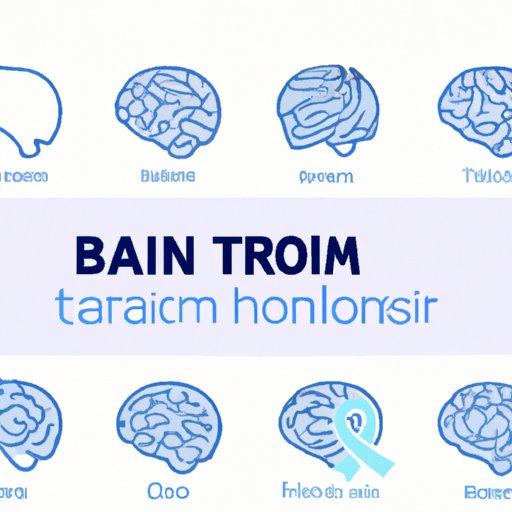
How Do You Know If You Have a Brain Tumor?
When it comes to our health, it’s important to be aware of any potential risks and symptoms, especially when it comes to something as serious as a brain tumor. A brain tumor is a mass or growth of abnormal cells within the brain, and identifying the symptoms and risk factors can help with early detection and treatment. Read on to learn more about the signs to look out for, the risk factors to be aware of, the diagnosis process, treatment options, prevention strategies, and psychological impact of a brain tumor diagnosis.
Symptoms to Look Out For
The symptoms of a brain tumor can vary depending on the size, location, and type of tumor. Some of the most common symptoms to look out for include:
Headaches
The most common symptom of a brain tumor is persistent headaches, which can often become worse over time. The headaches may be accompanied by nausea, vomiting, and changes in vision.
Seizures
Seizures and convulsions are also a common symptom of a brain tumor. These may be the first sign of the tumor and can be a sign that the tumor is growing or changing.
Difficulty Speaking or Balancing
Another symptom of a brain tumor is difficulty with speech or coordination. This can include slurred speech, difficulty finding the right words to say, dizziness, and clumsiness.
Changes in Vision
Changes in vision are also a potential symptom of a brain tumor. This can include double vision, blurriness, or loss of peripheral vision.
Risk Factors
While anyone can develop a brain tumor, there are certain risk factors that can increase the likelihood of developing one.
Genetic Influences
Some hereditary conditions, such as neurofibromatosis, can increase the risk of developing brain tumors. Additionally, a history of brain tumors in the family can also increase the risk.
Radiation Exposure
Exposure to high levels of radiation, such as those used in radiation therapy for other medical conditions, can increase the risk of developing a brain tumor.
Chemicals and Toxins
Exposure to certain chemicals and toxins, such as those found in pesticides and industrial materials, can also increase the risk of developing a brain tumor.
Diagnosis Process
If you are experiencing any symptoms that may indicate a brain tumor, your doctor may order a variety of tests and exams to determine the cause and extent of the tumor.
Medical Tests
Medical imaging tests, such as magnetic resonance imaging (MRI), computed tomography (CT) scan, and positron emission tomography (PET) scan can help to visualize the tumor and determine its location and size.
Exams
Neurological exams and vision tests can help to assess your overall brain function and identify any impairments.
Procedures
A biopsy, which involves removing a small sample of the tumor for lab analysis, may be necessary to identify the type of tumor and determine the most effective treatment course.
Treatment Options
The treatment options for a brain tumor will depend on the type, location, and size of the tumor, as well as the overall health of the patient.
Surgery
Surgery may be necessary to remove the tumor, if possible. This can help to improve symptoms and prevent the tumor from growing or causing further damage.
Radiation Therapy
Radiation therapy involves using high-energy radiation to kill cancer cells and shrink tumors.
Chemotherapy
Chemotherapy involves using medication to kill cancer cells and prevent the tumor from growing or spreading.
Prevention Strategies
While there is no surefire way to prevent a brain tumor, there are some strategies you can use to reduce your risk:
Healthy Lifestyle Habits
Eating a balanced, nutritious diet, getting regular exercise, and getting enough sleep can help to support overall brain health and reduce your risk of developing a brain tumor.
Avoiding Exposure to Radiation and Harmful Chemicals
Avoiding unnecessary exposure to radiation and harmful chemicals can also help to reduce your risk.
Psychological Impact
A brain tumor diagnosis can be a life-changing event that can have a significant emotional impact. It’s important to be aware of the psychological and emotional toll a diagnosis can take and to seek support as needed.
The Emotional Toll of a Brain Tumor Diagnosis
Many people experience feelings of fear, anxiety, and depression after a brain tumor diagnosis. Coping with the physical and emotional challenges of treatment can also be difficult.
Strategies for Coping
Seeking the support of family and friends, joining a support group or online community, and participating in activities that bring joy and relaxation can all help to reduce stress and improve mental health.
Support Resources
There are many resources available to help support those who have been diagnosed with a brain tumor and their loved ones. Some of these resources include:
Patient Support Groups
Support groups provide a safe space for patients to share their experiences, ask questions, and receive emotional support.
Online Communities
Online communities and forums can provide a platform for patients and caregivers to connect with others who are going through similar experiences and find valuable information and resources.
Counseling Services
Professional counseling can also help patients and caregivers navigate the emotional challenges of a brain tumor diagnosis and treatment.
Conclusion
While a brain tumor diagnosis can be overwhelming and scary, there are many resources and strategies available to help support patients and caregivers. By understanding the symptoms, risk factors, diagnosis process, treatment options, prevention strategies, and emotional impact of a brain tumor diagnosis, you can take proactive steps to protect your health and wellbeing.
If you are experiencing any potential symptoms of a brain tumor, it’s important to seek medical attention as soon as possible. Early detection and treatment can make a big difference in your overall prognosis. Remember to take care of your physical and emotional health, and don’t hesitate to seek out the support and resources you need to navigate this challenging time.





